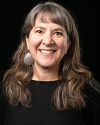Mission Statement
The graduate program in music therapy in the Hayes School of Music at Appalachian offers board certified music therapists preparation for advanced practice in music therapy in their desired areas of clinical practice.
Overview
The Master of Music Therapy Degree
The Master of Music Therapy (MMT) degree is designed to prepare board-certified or board-eligible music therapists for advanced practice in music therapy. Students undertake academic courses and advanced clinical work in order to demonstrate the Advanced Competencies outlined by the American Music Therapy Association. In cooperation with the academic advisor, each student selects a Specialty Area and elective courses that will help meet individual career objectives. Some Specialty Areas include Addictions, Expressive Arts, Gerontology, Health Care, Mental Health, Intellectual/Developmental Disabilities, and the Bonny Method of Guided Imagery and Music. In consultation with the advisor, the student also may design a unique specialty area. This degree is designed to meet the standards established by the American Music Therapy Association and the National Association of Schools of Music for the Master of Music Therapy degree.
Training in the Bonny Method of Guided Imagery and Music (GIM)
Appalachian offers all levels of training in the Bonny Method of Guided Imagery and Music (GIM), an advanced music psychotherapy method. Level I of GIM training is a required part of coursework for the Masters in Music Therapy. While all three levels of training in GIM may be beyond the scope of a master's degree, GIM training beyond Level I may be incorporated into an individual's graduate course of study, and the student may continue to the completion of training in the postgraduate period. MMT students interested in pursuing GIM training are encouraged to enroll in Level I training in the summer before their first fall semester of graduate study.
Dual Master's Degrees: Master of Music Therapy and Master of Arts Degrees
Students who desire to do so may be able to pursue a master's degree leading to licensure in clinical mental health counseling or marriage and family therapy concurrently with the MMT degree. Admission to the dual master’s degree program requires that the student apply and be admitted to both programs. The courses of study require completion of the core requirements for both the Master of Music Therapy and the Master of Arts in Clinical Mental Health Counseling or Marriage and Family Therapy degree programs. For students completing the dual degrees, some counseling courses serve as the Specialty Area courses for the MMT degree.
Admissions Information
Applicant Qualifications
Successful applicants for the Master of Music Therapy degree program must have:
- Completed a Baccalaureate degree or equivalency program from an accredited college or university
- Acquired proficiency in music theory, music history/literature, music performance
- Passed the examination administered by the Certification Board for Music Therapists.
Admission Requirements
The following materials will be uploaded as a part of the application through the Williams Graduate School:
- Two letters of recommendation from individuals who can address the applicant’s academic, personal, and professional suitability for graduate-level work in music therapy.
- Master of Music Therapy Program Questionnaire: MMT Questionnaire for MT-BC or Applicant with Bachelor's in Music Therapy (includes audition information)
These are then reviewed by Graduate Music Therapy Admissions faculty and selected candidates are invited to interview (via Zoom or in person).
Audition Information
Application for admission to the Master of Music Therapy degree requires the board-certified therapist to submit a live or videotaped audition demonstrating music skills for professional music therapists. The audition will consist of three popular, folk, or standard songs, each sung and played on either piano or guitar by the applicant.
Enrollment Limit and Application Deadline
In order to maintain a high-quality and individualized program, enrollment in the Master of Music Therapy (MMT) degree program will be limited to 10 students per academic year. Early application is encouraged, and application materials should be received and interview completed by February 1.
Transfer of Credits
Students may be permitted to transfer into the MMT degree up to 6 semester hours of appropriate resident work completed in another approved graduate school, provided the work has been included in neither a previous degree nor in a Music Therapy Equivalency.
Degree Course Requirements
Course Requirements for the Master of Music Therapy (Code: 560A) | ||
|---|---|---|
Required Music Therapy Courses |
| 18 |
Research Course |
| 3 |
Music or Music Therapy Elective Courses |
| 3 |
Specialty Area Courses |
| |
NOTES |
| |
Schedule of Course Offerings
Courses Offered During the Academic Year
- MUS 5010 Research in Music Therapy
- MUS 5050 Supervision in Music Therapy
- MUS 5051 Advanced Topics in Music Therapy
- MUS 5061 Advanced Clinical Improvisation
- MUS 5200 Music Therapy Laboratory
- MUS 5900 Advanced Music Therapy Practicum
Courses Offered Every Summer
- MUS 5060 Bonny Method of GIM
Courses Offered Every Term
- MUS 5999 Thesis
- Specialty Area Courses
Assistantships and Scholarships
View general Assistantship and Scholarship information
Music Therapy Assistantships
The Cratis Williams School of Graduate Studies at Appalachian awards several scholarships to outstanding graduate students each year. These scholarships are awarded on the basis of academic excellence, talent, and financial need.
Graduate assistantships are awarded to full-time graduate students on a yearly basis and carry a stipend of $9,500-$11,500, depending on duties. Responsibilities of qualified graduate assistants in music therapy may include supervision of students completing pre-internship clinical experiences. Music therapy graduate assistantships that include supervision will be available only to applicants who are board certified music therapists.
For information about the Music Therapy Program at Appalachian State University, contact
Melody Schwantes, Director
Graduate Music Therapy Programs
Appalachian State University
Boone, North Carolina 28608
ms18994@appstate.edu



